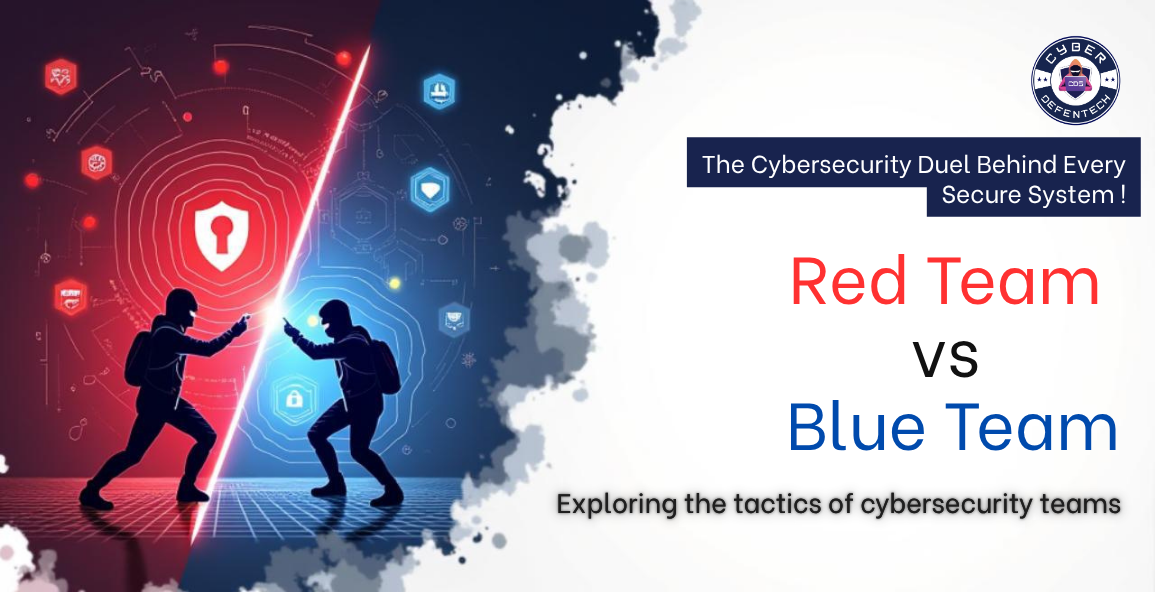
Red Team vs Blue Team cyber attacks don’t merely knock, but attempt to break down the door, both stealthily and continuously. To defend against these computer attacks, organizations use two specialized forces in a strategic, continuous campaign: the Red Team and the Blue Team. This isn’t a fantasy cyber battle.
It’s an offensive-versus-defensive simulation with high stakes — and learning how these two teams operate can define your whole career in cybersecurity.
Red Team vs Blue Team Explained
In the constantly changing cybersecurity landscape, the Red Team vs Blue Team approach lies at the center of aggressive defense methodologies. These groups are two sides of the same coin — one is an impersonation of the attacker, and the other is a defender of intrusions. Knowing what they do isn’t a question of curiosity; it’s critical information that can chart the path for your cybersecurity career.
🔴 The Red Team: Ethical Hackers Who Think Like Attackers
Red Teamers are the attack experts. They are authorized experts who take on the attitude and methods of actual cyber attackers — but with an aim to enhance security, not to break through it. By mimicking attacks, they reveal vulnerabilities before nasty hackers can.
Important activities carried out by the Red Team are:
✅ Penetration testing of applications, systems, and networks to determine resilience.
✅ Phishing and social engineering campaigns to validate human vulnerabilities.
✅ Taking advantage of misconfigured systems or unpatched software.
✅ Physical intrusions, such as breaking into restricted areas or evading badge systems.
👉The Red Team’s mission: Identify technical, procedural, and human weaknesses and report them thoroughly so organizations can mitigate them before actual attackers attack.

🔵The Blue Team: Defenders of the Digital Fortress
The Blue Team are the defenders — cybersecurity experts who identify, block, and react to attacks in real-time. While the Red Team holds mock attacks, the Blue Team fortifies defenses by watching, analyzing, and strengthening security systems.
Important activities carried out by the Blue Team are:
✅ Penetration testing of applications, systems, and networks to determine resilience.
✅ Phishing and social engineering campaigns to validate human vulnerabilities.
✅ Taking advantage of misconfigured systems or unpatched software.
✅ Physical intrusions, such as breaking into restricted areas or evading badge systems.
👉The Red Team’s mission: Identify technical, procedural, and human weaknesses and report them thoroughly so organizations can mitigate them before actual attackers attack.
Why the Red Team vs Blue Team Model is Important?
This isn’t theory or a computer game; Red Team vs Blue Team simulations are essential to cybersecurity in the real world. By permitting the Red Team to simulate attackers within a controlled environment, organizations reveal and repair vulnerabilities before they’re exploited in the wild.
While the Blue Team hones its detection, analysis, and incident response skills in a secure environment. The interplay between the Red Team and Blue Team creates an ongoing improvement loop that makes defenses stronger over time.
The end result? Organizations have a more resilient, more responsive security stance — critical in a world ruled by advanced persistent threats, zero-day attacks, ransomware, and more sophisticated social engineering attacks.
🎯 Where Do You Fit in the Red Team vs Blue Team World?
If you’re looking at a career in cybersecurity, it’s important to know where your natural inclination is:
Red Team Track: Are you passionate about breaking down how things work, creative thinking, and solving challenges? Red Team positions like Penetration Tester, Ethical Hacker, or Red Teamer may be your destiny. Tools to learn: Metasploit, Burp Suite, Nmap, and Kali Linux.
Blue Team Track: Do you like digging into patterns, digging into incidents, and creating tough defenses? Positions like SOC Analyst, Incident Responder, or Cybersecurity Engineer might be your best bet. Specialized tools include SIEM platforms such as Splunk, network analyzers such as Wireshark, and endpoint detection solutions (EDR).
Certifications That Prepare You for your Career :
Certifications are essential for establishing credibility and practical skills in both paths. Industry-standard certifications are as follows:
CEH (Certified Ethical Hacker) – the basis for Red Team experts.
ECSA (EC-Council Certified Security Analyst) – advanced-level penetration testing and analysis.
CND (Certified Network Defender) – ideal for Blue Team experts with a focus on network defense.
CSA (Certified SOC Analyst) – suitable for those entering a career path in Security Operations Centers.
🎓 About the EC-Council Connection –
EC-Council is one of the world’s premier cybersecurity certification organizations. Its training programs are designed to offer practical, industry-based skills needed by both Red Team and Blue Team professionals. If you want to mimic threats or counter them, EC-Council certifications give you globally accepted credentials that employers respect.
EC-Council Official Partners such as Cyber Defentech provide unique benefits, including official course materials, certified trainers, live labs, and hands-on experience. This guarantees students not only learn but acquire the skills and confidence needed for actual job opportunities in cybersecurity.
🔔Final Thoughts: Red Team vs Blue Team – Allies, Not Enemies
In cybersecurity, Red Team vs Blue Team isn’t competitive — it’s cooperative. The Red Team identifies vulnerabilities, and the Blue Team discovers how to fill them in. Together, they develop a robust security framework that adapts to address new threats.
Where do your skills and interests lead you? Do you possess the creativity and inquisitiveness of an ethical hacker or the analytical accuracy of a watchful guard?
Your cybersecurity journey begins with a single decision — and a dedication to ongoing education.
🚀Learn More about Cybersecurity
Interested in going deeper on Red Team vs Blue Team operations, cybersecurity trends, or career insights from experts? Check out our site at cyberdefentech.com for articles, resources, and training offerings.
And don’t miss following Cyber Defentech on Instagram, LinkedIn, and more for daily insights, career advice, and certification details.
📞 Reach Out:
Call/WhatsApp: +91-8448046612
Email: training@cyberdefentech.com
Website: cyberdefentech.com

